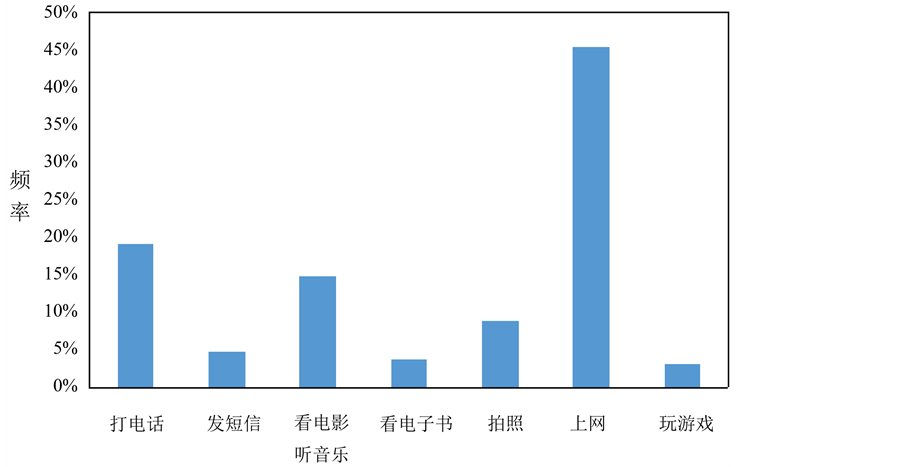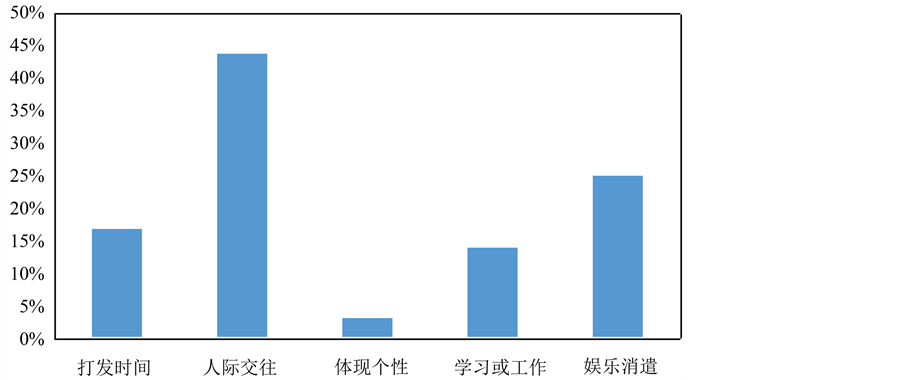1. 引言
随着科技的不断进步,使用手机已成为了一种主流的生活方式,人们可以在任何时间、任何地点随意的沟通交流,其功能也从最初的单一化向多元化发展。手机已经成为了现代社会人们不可或缺的生活必需品。根据第36次《中国互联网络发展状况统计报告》的统计,截止2015年6月底,我国网民规模达到6.68亿,互联网普及率攀升至48.8%。大学生作为年轻一代的代表,已成为手机使用重要群体,高使用率是大学生手机使用的典型特征。手机依赖已经蔓延到了绝大多数的大学生的生活中,由于情感表达的满足、沟通的及时性、较低的资费等特征,渐渐使相当一部分大学生已经沉溺于这种虚拟的交往中。这种长时间沉溺于虚拟的人际交往中,会弱化现实的人际交往能力,不利于学生的个人成长及以后的社会适应。手机依赖现象不仅对身体造成了损害,而且严重影响了学生的学习效率,对学生的心理健康和社会功能也造成严重影响 (师建国,2009) 。手机依赖的定义和标准不一,但大多数研究都认为手机依赖是过度沉迷于以手机为媒介的各种活动,对手机使用产生强烈、持续的渴求感与依赖感,并且无法自控从而导致个体出现明显的社会、心理功能等损害 (Yen, Tang, Yen, et al., 2009) 。已有研究发现,过度使用手机会导致个体逃避该完成的学习任务或降低完成任务的效率 (Leung, 2008) ,而且还会伴随有高度的焦虑、抑郁、强迫、人际关系敏感等不良症状 (黄海,周春燕,余莉,2013) 及更强的孤独 (刘红,王洪礼,2011) 。因此,手机依赖问题应该受到人们的重视。
2. 对象与方法
2.1. 对象
样本的是通过现场发放方式采集,主要以烟台部分高校的学生为主。共发放问卷300份,回收291份,其中有效问卷291份,有效率97%。其中,其中男生123人(42.3%),女生168人(57.7%)。独生子女140人(48.1%),非独生子女151人(51.9%),城市124人(42.6%),乡镇167人(57.4%)。大一74人(25.4%),大二73人(25.1%),大三69人(23.7%),研究生75人(25.8%)。调查时间为2015年3月到4月间,所有问卷均由四名研究生主持施测,由大学生被试现场独立认真完成。
2.2. 研究工具
1) 手机依赖:本研究采用的手机依赖指数(MPAI)量表经原作者Leung教授授权,香港中文大学梁永炽教授将其翻译成中文版,主要用于诊断青少年和大学生手机成瘾。该量表采用5点评分,1表示从不,5表示总是,一共17个题项,4个维度,分别为戒断性、失控性、低效性和逃避性。断性包括项目8、9、10、11,失控性包括了项目1、2、3、4、5、6、7,低效性包括项目15、16、17,逃避性包括项目12、13、14。总得分越高则表明个体手机依赖程度越高。MPAI总量表的Cronbach’s α系数为0.91。失控性、戒断性、逃避性和低效性四个分量表的Cronbach’s α系数分别为0.84、0.83、0.87和0.81。总量表的重测信度为0.69,失控性、戒断性、逃避性和低效性四个分量表的重测信度分别为0.61、0.70、0.69、和0.60。
2) 大学生人际关系:采用郑日昌主编的《大学生心理诊断2》中的《人际关系综合诊断量表》,该量表是一份人际关系行为困扰的诊断量表,共28道题,每道题作“是”,“否”回答。回答“是”得1分,“否”得0分。有四个纬度人际交谈困扰、人际交友困扰、待人接物困扰、异性交往困扰。本研究中,Corbnach Q = 0.7598。
3) 自我调节学习:国内方平(2003)以社会认知理论为基础,在已有国内外大量问卷的基础上编制了《自我调节学习问卷》,其编制目的是测量大学生的自我调节学习水平。问卷包括四个分问卷:动机策略问卷,学习策略问卷(元认知和认知策略、资源管理策略问卷),目标策略问卷,学业意志AVS工策略问卷(动机、情绪控制问卷)。该量表为5点量表,“5”代表非常符合,“4”代表比较符合,“3”代表不确定,“2”比较不符合,“1”代表非常不符合,选项即为所得分数,(如:被试在某题项上选“5”,则该题项得分记为5)。根据各维度题项分配情况记录表将各维度包含的项目得分相加,计算各分量表及量表总分。信效度检验结果显示修订后的问卷具有较理想的信效度指标,符合心理测量学的标准,根据修订结果,四个分问卷的克伦巴赫系数分别为:0.8889,0.9231,0.7012,0.7561。
2.3. 统计分析
本研究采用统计软件SPSS19.0进行处理分析。
3. 结果
3.1. 大学生手机依赖的总体特征
大学生使用最多的手机功能排名前三是用手机上网(44.7%)、打电话(20.6%)、看电影(15.5%)。从图1中可看出用手机上网的人数已经远远超过用手机打电话的人数。

Figure 1. College students use the most mobile phone function distribution map
图1. 大学生使用最多的手机功能分布图
大学生手机使用最主要的动机前三是人际交往需求(43.0%)、娱乐消遣(25.8%)、学习与工作需要(13.7%)。从图2中可看出大学生人际交往需求比重最大,远远超过其他动机需求。
37.8%大学生手机平均每天使用手机时间2~6 h。34.4%大学生平均每天使用手机时间2~4 h。从图3中可看出大学生把大多数的时间花在手机上。
3.2. 大学生手机依赖在性别、年级、独生子女与否上差异检验
3.2.1. 大学生手机依赖在性别上的差异研究
通过对不同性别大学生手机依赖的t检验发现(见表1):大学生手机依赖总分在男女之间存在显著性差异(p < 0.05);也就是说,与男生相比,女生更倾向于花更多的时间使用手机。
3.2.2. 大学生手机依赖在年级上的差异检验
通过对不同年级大学生手机依赖总分及各个维度的方差分析(见表2),得出:不同年级大学生的手机依赖总分差异显著(p < 0.01),不同年级大学生在失控性、戒断性、逃避性和低效性上显著(p < 0.01)。
3.2.3. 大学生手机依赖在独生子女与否上的差异检验
通过对是否是大学生独生子女对手机依赖的t检验(见表3),发现:大学生手机依赖总分在独生子女与否之间不存在显著性差异;而独生子女在手机依赖的失控性、低效性这两个维度上存在显著差异。
3.3. 人际关系在不同水平手机依赖间的差异
根据手机依赖总分,选出高分组(27%)和低分组(27%),对两组进行T检验。结果如下:大学生手机依赖高分组与手机依赖低分组人际关系维度上并没有显著性差异;在待人接物困扰维度上,手机依赖高分组得分显著高于低分组(p < 0.0l),见表4。
3.4. 自我调节学习在不同水平手机依赖间的差异
根据手机依赖总分,选出高分组(27%)和低分组(27%),对两组进行T检验。结果如下:大学生手机依赖高分组与手机依赖低分组在自我调节学习维度上并没有显著性差异;在学习意志维度上,手机依赖高分组得分显著高于低分组(p < 0.0l) (见表5)。
3.5. 手机依赖与人际关系及自我调节的相关研究
对手机依赖总分及失控性、戒断性、逃避性、低效性与人际关系总分及人际交谈困扰、人际交友困扰、待人接物困扰、异性交往困扰与自我调节学习总分进行相关分析,结果见表6。手机依赖总分与人际交往总分呈显著负相关(p < 0.0l),其失控性、戒断性、逃避性、低效性与人际交往总分均呈显著负相关(p < 0.0l)。在人际关系的四个维度上,手机依赖总分与人际交谈困扰、人际交友困扰、待人接物困扰、异性交往困扰都呈显著负相关关系;待人接物困扰、异性交往困扰在失控性、戒断性、逃避性、低效性上存在显著负相关,人际交谈困扰、人际交友困扰在手机依赖四个维度上不存在显著负相关;在手机依赖与自我调节学习的关系上,数据显示手机依赖总分及其各维度与自我调节学习总分及各个维度均有显著性负相关。

Figure 2. College students use the most important mobile phone distribution diagram
图2. 大学生手机使用最主要的动机分布图

Figure 3. College students on average daily use of mobile phone time distribution map
图3. 大学生平均每天使用手机时间分布图

Table 1. College students’ mobile phone dependence on gender differences (n = 291)
表1. 大学生手机依赖在性别上的差异(n = 291)
注:**表示p < 0.0l,*表示p < 0.05 (下同)。

Table 2. Mobile phone dependence of college students in grade difference (n = 291)
表2. 大学生手机依赖在年级上的差异(n = 291)

Table 3. College students mobile phone dependence on the difference between the only child or not (n = 291)
表3. 大学生手机依赖在独生子女与否上的差异(n = 291)

Table 4. Mobile phone dependence of college students in different dimensions of interpersonal relationships (n = 291)
表4. 大学生手机依赖在人际关系各个维度上的差异(n = 291)

Table 5. Mobile phone dependence of college students in different dimensions of interpersonal relationships (n = 291)
表5. 大学生手机依赖在人际关系各个维度上的差异(n = 291)

Table 6. The relationship between mobile phone dependence, interpersonal relationship and self regulation (n = 291)
表6. 手机依赖与人际关系及自我调节的相关关系(n = 291)
4. 讨论
4.1. 大学生手机依赖的总体特征
本研究选取了300名大学生,大学生手机依赖总分分布呈正态分布,总分平均得分是78.97,显著低于理论均值60分,大学生手机依赖总体高于平均值,说明大学生的手机依赖较为普遍和严重。通过对300名大学生的手机依赖的状况,编写5道调查题,较为突出的结果:1) 大学生使用最多的手机功能排名前三是用手机上网(44.7%)、打电话(20.6%)、看电影(15.5%)。用手机上网的人数已经远远超过用手机打电话的人数。可能的原因是随着手机功能的越来越多,手机使用的时间也越来越长,占用了过多的时间,导致在其他生活、学习方面的时间相对减少,使大部分学生通过手机来打发时间、娱乐消遣,手机使用确确实实已经影响了大学生的日常生活。长期过度使用手机渐渐就成为了一种习惯。2) 大学生手机使用最主要的动机前三是人际交往需求(43.0%)、娱乐消遣(25.8%)、学习与工作需要(13.7%)。大学生人际交往需求比重最大,远远超过其他动机需求。可能原因大学生如今较高中学习压力减少,把关注的目光向社会发展,需要更多的交往来丰富自己的生活。大学有更多属于自己的时间和空间,在这一期间需要接触更多的伙伴。并且,大量的研究表明成瘾性行为与孤独感、社会支持有密切的关系。孤独感的不断增加,社会支持不断减少,成瘾性行为会不断增加。大多数研究也提到内向、性格孤僻的人更容易出现手机依赖 (王芳,李然,路雅等,2008) 。学校、社会要给予一定的重视和关注,可以在正常的课时之外多开展一些活动,丰富大学生的生活,让同学们交流和沟通更频繁一些。3) 37.8%大学生手机平均每天使用手机时间2~6 h。34.4%大学生平均每天使用手机时间2~4 h。手机使用年限越长,越容易产生手机使用问题 (刘鹏,2014) 。大学生使用手机上网时间越来越长,不利于学生身心健康以及更容易手机成瘾。高校要通过一定的方式来引导大学生正确使用手机,引导大学生回归现实,并不断培养在现实社会中的社交能力 (姜永志,白晓丽,2013) 。
4.2. 大学生手机依赖在性别、年级、独生子女与否的差异比较
研究结果表明通过对不同性别大学生手机依赖的t检验发现:大学生手机依赖总分在男女之间存在显著性差异(p < 0.05);也就是说,与男生相比,女生把手机看得更重要,更倾向于花更多的时间使用手机。源于女生需求,较男生更常用手机来建立和维持社交关系 (胡心怡,刘霞,申继亮等,2007) 。男女性别在手机依赖各个维度上,男性的平均值都要高于女生。原因可能在于,男生与他人沟通和交流都常常不易表露,但处理一些棘手的事情时,他们常常会找自己的伙伴一起合作处理。虽然女生的活动范围较大,善于言辞,交流。但是,大多数女生面对自己的个人困惑和难题都不轻易与他人分享和沟通,甚至是自己的家人和伙伴。而是向手机上的网络进行寻求帮助或者通过手机抒发自己此时此刻的心情和情绪。目前国内对于手机依赖的性别差异,并没有一致性结论。一些研究表明,大学生手机依赖总分在性别间的差异无统计学意义 (黄海,周春燕,余莉,2013) 。但仍有一些研究也同样证实了本研究,认为大学生手机依赖的确存在性别差异,与男生相比,女生更容易产生手机依赖行为 (孙玲,汤效禹,2011) 。
在年级之间,大二和研究生的手机依赖最高,可能原因之一是学校在这两个年级组织的活动不丰富。大二的同学对学校的好奇和渴望不断降低,把自己的目光投射到自己个体的人际关系圈。需要用手机不断修补和扩大自己的交际圈,而不是仅仅在自己的周围生活中。同时,由于不断的了解了大学生活,也有了源源不断的困惑和难题,所以心理团体辅导这时非常重要。学校心理辅导部不仅要关注大一的适应问题,同时还要关注大二、三的学习、生活困惑,给予一定的建议和指导。大三的失控性、逃避性、低效性较其他年级程度较低。失控性是指手机使用者在手机上花费大量时间,不能自控。逃避性指利用手机来回避一些现实问题。低效性是指过度使用手机影响到日常生活学习效率。大三年级的同学课程不断开始增多,也开始考虑自己的就业方向,在手机上寻求娱乐、游戏、聊天的空闲时间开始变少。外在的环境如毕业和就业压力,让大三的学生不得不面对现实。
独生子女群体和非独生子女群体之间,在手机依赖失控性维度、低效性维度上有显著差异,并且,独生子女的均值要高于非独生子女。当今,独生子女较非独生子女受到的父母的爱更多,几乎是有求必应,高科技电子设备,一应俱全。父母的纵容会让他们更快、更深的沉浸在网络的世界中,不能自拔,不仅影响到日常的学习生活同时也影响到他们的身心健康。非独生子女相对于独生子女有较少的孤独感,有更多交流沟通的机会。
4.3. 手机依赖与人际关系及自我调节的相关研究
手机依赖总分与人际交往总分呈显著负相关(p < 0.0l),其失控性、戒断性、逃避性、低效性与人际交往总分均呈显著负相关(p < 0.0l)。说明手机依赖总分越高,人际关系就越差。学校、社会和家庭要关注学生的手机使用情况,可以采取一些标准和规则来约束学生手机的使用。在人际关系的四个维度上,手机依赖总分与人际交谈困扰、人际交友困扰、待人接物困扰、异性交往困扰都呈显著负相关关系;待人接物困扰、异性交往困扰在失控性、戒断性、逃避性、低效性上存在显著负相关。大学生的困扰的种类越多,程度越深,手机依赖就越严重。学校要多关注孩子在成长过程中遇到的困惑和难题,给予一定的指导。同时我们也建议学校开设相关课程,引导大学生建立健康的人际关系,减少生活中可以解决的困扰,从而避免手机依赖的发生。在手机依赖与自我调节学习的关系上,数据显示,手机依赖总分及其各维度与自我调节学习总分及各个维度均有显著性负相关。
5. 结论
1) 大学生使用最多的手机功能排名前三是用手机上网(44.7%)、打电话(20.6%)、看电影(15.5%)。大学生手机使用最主要的动机前三是人际交往需求(43.0%)、娱乐消遣(25.8%)、学习与工作需要(13.7%)。37.8%大学生手机平均每天使用手机时间2~6 h。34.4%大学生平均每天使用手机时间2~4 h。
2) 大学生手机依赖总分在性别之间存在显著性差异(p < 0.05)。
3) 不同年级大学生的手机依赖总分差异显著(p < 0.01),不同年级大学生在失控性、戒断性、逃避性和低效性上显著(p < 0.01)。
4) 大学生手机依赖总分在独生子女与否之间不存在显著性差异;而独生子女在手机依赖的失控性、低效性这两个维度上存在显著差异。
5) 手机依赖总分与人际交往总分呈显著负相关(p < 0.0l),其失控性、戒断性、逃避性、低效性与人际交往总分均呈显著负相关(p < 0.0l)。在人际关系的四个维度上,手机依赖总分与人际交谈困扰、人际交友困扰、待人接物困扰、异性交往困扰都呈显著负相关关系;待人接物困扰、异性交往困扰在失控性、戒断性、逃避性、低效性上存在显著负相关,人际交谈困扰、人际交友困扰在手机依赖四个维度上不存在显著负相关;在手机依赖与自我调节学习的关系上,数据显示手机依赖总分及其各维度与自我调节学习总分及各个维度均有显著性负相关。